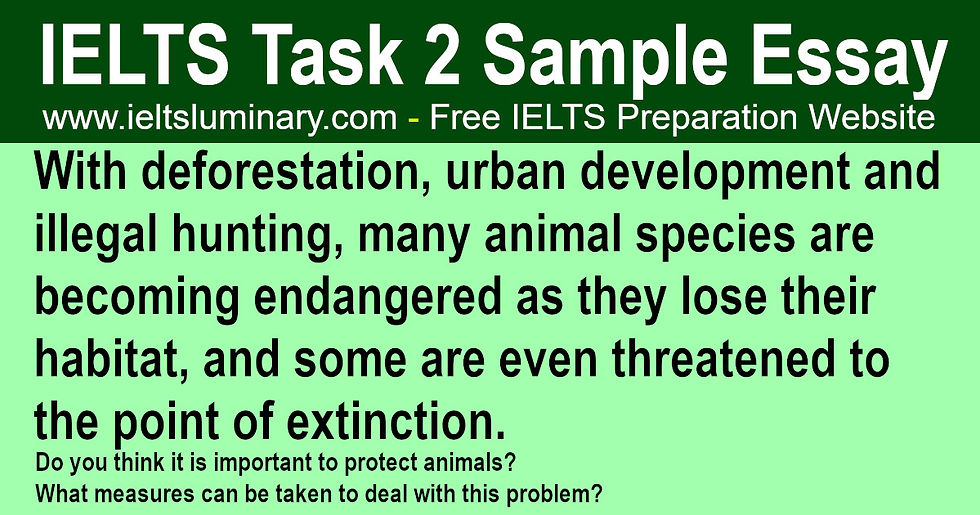With Deforestation, Urban Development And Illegal Hunting, Many Animal Species Are Becoming Endangered - IELTS Essay
- IELTS Luminary

- Jun 9, 2024
- 3 min read

Get your personalised IELTS Essay Feedback from a former examiner
Download IELTS eBooks, get everything you need to achieve a high band score
Sample Essay 1
Deforestation, urbanization, and illegal hunting have relentlessly pushed numerous animal species towards endangerment and even extinction. This essay contends that safeguarding these species is not merely important but imperative. It will examine both the ecological impacts of extinction and the ethical responsibilities towards biodiversity conservation.
Firstly, the ecological ramifications of species loss are profound and far-reaching. Every species plays a unique role in its ecosystem, contributing to a complex web of interdependencies known as biodiversity. For instance, the extinction of a single pollinator species can lead to the collapse of plant populations that rely exclusively on that pollinator, which in turn affects species that depend on those plants for food and shelter. This domino effect can lead to ecological collapse, disrupting services ecosystems provide, like clean air, water purification, and climate regulation. The reintroduction of wolves in Yellowstone National Park, USA, which helped stabilize other animal populations and rejuvenate the park’s ecosystem, exemplifies the positive impact of preserving biodiversity.
Secondly, there exists an ethical imperative to protect animal species. Beyond ecological benefits, humans have a moral duty to ensure the survival of other species with whom we share the planet. This duty arises from the recognition that animals possess intrinsic value and rights, independent of their utility to humans. Moreover, many of the threats to wildlife—such as habitat destruction and overhunting—are the direct result of human activities. Thus, it is incumbent upon us to rectify the harm we have caused. Initiatives like the establishment of wildlife corridors in India, which allow safe passage for tigers and other species between isolated reserves, demonstrate effective measures for mitigating human impact on wildlife.
In conclusion, the protection of endangered species is both an ecological necessity and a moral obligation. Through actions such as ecosystem restoration and the creation of wildlife corridors, we can address the adverse effects of human activity on wildlife, thereby preserving the natural heritage for future generations.
Download IELTS eBooks, get everything you need to achieve a high band score
Sample Essay 2
Deforestation, urban sprawl, and illegal poaching are increasingly threatening the survival of many animal species, propelling them towards extinction. This essay argues that animal protection is essential and will discuss the benefits of biodiversity and the effectiveness of conservation laws.
The first point to consider is the inherent value of biodiversity, which offers significant environmental and economic benefits. Diverse ecosystems are more resilient; they recover from disruptions such as natural disasters more quickly and are better at regulating disease, which benefits agricultural communities by ensuring healthy pollination and pest control. These ecological services are indispensable as they help maintain environmental balance and ensure sustainability of food sources. Economically, biodiversity is pivotal for sectors like ecotourism and pharmaceuticals, which rely on a variety of species to attract tourists and discover new medicines, respectively. For example, Costa Rica has harnessed its rich biodiversity to become one of the world's leading ecotourism destinations, significantly boosting its economy and providing jobs to local communities, thereby promoting a sustainable economic model that other nations can emulate.
Moreover, implementing strict conservation laws has proven to be an effective strategy for wildlife protection. Countries that have enforced comprehensive anti-poaching regulations and established protected areas have seen significant recoveries in wildlife populations. This approach not only prevents the immediate threats like poaching and habitat loss but also reinforces the ecological balance and biodiversity. Nepal, for instance, celebrated zero rhino poachings in several years due to stringent laws and community conservation efforts. These laws not only curb immediate threats but also foster a culture of wildlife value and conservation, ensuring long-term commitment to animal protection. The involvement of local communities in these efforts has been crucial, as it empowers them and provides economic benefits, further solidifying the support for wildlife conservation initiatives. This community engagement, combined with legal frameworks, forms a robust defense against the extinction of endangered species.
In conclusion, safeguarding endangered species through biodiversity preservation and rigorous legal frameworks is crucial. These strategies not only protect wildlife but also sustain ecological balance and foster economic growth.
Get your personalised IELTS Essay Feedback from a former examiner
Download IELTS eBooks, get everything you need to achieve a high band score



